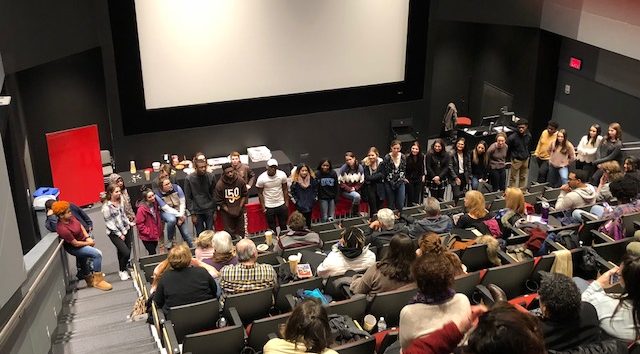There are countless questions to consider when addressing documentary ethics. Documentary is based in telling the truth; in order to do so, those involved the project being documented must be a part of the telling. This does not just include administrators or politicians, but any and all affected in some way by the issue; it is unfair to the issue to only tell one side.
First, there is the careful question of access versus rights. As Johnson pointed out in her director’s statement, documentarians often have access to horrible situations in this world, and film them and subsequently get out. The people being filmed cannot do the same. The documentarian may have gained access to this story, but do they have the rights to it? Do they have signed consent forms from each and every human filmed in that area? What about babies? Animals? If they do have signed consent forms from the subjects, that would likely somewhat alter the subject’s behavior during filming, though hopefully not to an extreme amount.
Once everyone is contacted and rightfully involved in the film, then comes the editing question. The documentarian must make conscious choices about what to include and not to include; what footage he or she discards could change a story in a drastically impactful fashion. Is it ethical for Herzog to make the decisions that he did when telling Treadwell’s story? Is it ethical for him to listen to the audio of his death in front of Treadwell’s family/friends? Is it ethical for Herzog not to play the audio of Treadwell’s death in the film, after the audience stuck with him throughout? Why? Is it ethical for Herzog to take Treadwell’s story and bring it to light in his own perspective?
Drew dealt with this in immensity as well: his own subject, over his shoulder, instructing him as to what he wanted Drew to include! How would Grizzly Man be different if Treadwell had made the film alongside Herzog, as a collaborator? Would it even be called Grizzly Man? How would the film have been different if Treadwell had not been killed by his subjects? Would Herzog have even bothered?
Finally, there is the question of why ethics itself is important in documentary. Here is a simple but true statement: Documentarians attempt to tell the truth. Looking at just this statement, one would see ‘ethics’ as an actual constraint, limiting how much of the truth can be told. And yet, it is absolutely necessary in human culture; if documentary were supremely unethical, we would consider it inhuman. We would be appalled.
Is our morality limiting our potential to truthfully document? If so, why do we consider it appropriate and necessary to sacrifice that extra truth?
